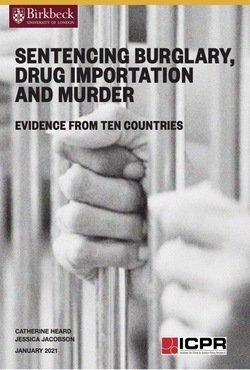Sentencing Burglary, Drug Importation and Murder: Evidence from Ten Countries
By Catherine Heard and Jessica Jacobson
In all countries across the globe, the prison sentence is a primary means by which the state censures and seeks to contain behaviours deemed illegal. States vary widely in terms of which types of illegal conduct are deemed to merit custody rather than non-custodial sanctions, and the lengths of prison terms imposed for conduct that does cross the custody threshold. Accordingly, people who are convicted in relation to similar conduct may receive widely differing penalties, depending on the country in which they are convicted and sentenced. This report examines the extent and nature of international disparities in custodial sentencing. It is the fourth in a series of research reports produced under the banner of ICPR’s international, comparative project, ‘Understanding and reducing the use of imprisonment in ten countries’, launched in 2017. The ten jurisdictions which are the focus of this research span all five continents: Kenya, South Africa, Brazil, the USA (and more specifically, New York State), India, Thailand, England and Wales, Hungary, the Netherlands, and Australia (more specifically, New South Wales). On the basis of legal and policy analysis and interviews with 70 legal practitioners across the ten jurisdictions, the report outlines the sentencing frameworks and probable sentencing outcomes for three hypothetical offences: a domestic burglary by a man with previous convictions for similar offences; drug importation (400 grams of heroin or cocaine) by a woman from a less developed country; and the intentional homicide, involving a knife, of one young man by another.
-
Each offence presents distinct policy challenges for sentencing law and practice, and each offers lessons for reform aimed at curbing the relentless rise in prisoner numbers seen in much of the world in recent decades. The emerging lessons for sentencing reform, and a series of high-level policy recommendations, are presented with reference to the broad themes of: • The role of previous convictions in sentencing – rationales and repercussions • The vexed and persistent problem of short prison sentences • Drugs policies and the scope for alternatives to harsh sentencing of drug offences • The meaning and implications of life sentences • Approaches to the sentencing of murder.
London: Institute for Crime & Justice Policy Research, 2021. 26p.


